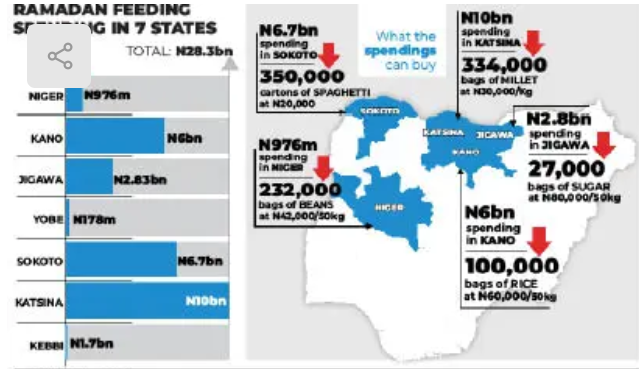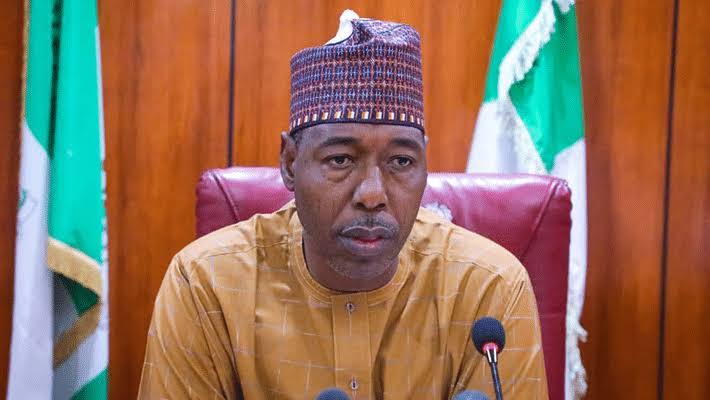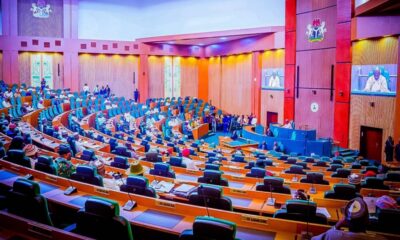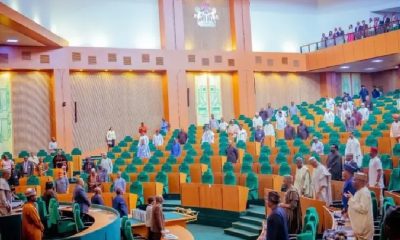News
Kano, Katsina, Sokoto, 4 others spend N28.3bn on Ramadan feeding

By Kayode Sanni-Arewa
As Ramadan fast progresses, seven states of the federation have budgeted over N28. 3 billion to feed residents during the period, figures released by the states and put together by Daily Trust revealed.
The states include Katsina, Sokoto, Kano, Jigawa, Kebbi, Niger and Yobe.
It was gathered that many other states, especially in the North, have earmarked various sums for the project but have refused to make the actual amount public.
This has elicited anxiety in many quarters, with some clerics calling for accountability, considering the humongous amount set aside.
They said even though it was not entirely wrong to support the less privileged to feed during Ramadan because of the reward therein, they nonetheless called for caution concerning the possibility of abusing the process.
Katsina State topped the chart for the feeding programme by budgeting N10 billion.
Sokoto earmarked N6.7 billion, Kano set aside N6 billion, Jigawa N2.83 billion, Kebbi N1.5 billion, Niger N976 million, and Yobe N178 million respectively.
Governor Dikko Umar Radda, who disclosed the amount for the Ramadan feeding while inaugurating the committee that will oversee the distribution of the grains to the beneficiaries, said the gesture was to support citizens of the state.
In Sokoto, Governor Ahmed Aliyu said that the state expended N6.7 billion for the provision of Ramadan and other packages to the people of the state.
Also, the Kano State government said it is targeting four million people in the 2024 Ramadan feeding programme across the 44 local government areas of the state.
The Commissioner for Information and Home Affairs, Baba Dantiye, said the aim was to feed the less privileged.
Speaking to a national daily, Dantiye said the densely populated Kano metropolis, which is made up of eight LGAs has 90 special centres that include mosques, remand centres, almajiri schools, and hospitals.
He said: “In each centre, we have three women who cook and three men that provide security so that people don’t tamper with the food or cause stampedes.
“In each centre, there are two bags of rice to feed at least 200 people, that is 100 people per bag; there are also varieties such as beans cake and pap and other assorted food being cooked daily and is served between 6.30pm and 7.00p.m targeted at the most-needy.”
The Commissioner for Information in Jigawa, Sagir Musa, said in a statement that the Ramadan feeding programme will be implemented through 609 feeding centres, with a focus on providing three different food items to 182,700 poor and vulnerable people daily.
He said there will be dedicated feeding centres to be established at each of the state’s ten tertiary institutions.
He said that approximately 3.8 million vulnerable persons would benefit from the feeding programme throughout the Ramadan period.
Apart from approving a budget of N2.83 billion for the special feeding, the commissioner said the state executive council also allocated N1.125 billion for emergency procurement of additional rice and spaghetti to ensure adequate food supply across the state.
Kebbi’s N1. 5bn for the Ramadan feeding programme will be dispensed in 69 feeding centres, it was learnt.
The distribution will target three mosques in each of the 21 local government areas, according to the Special Adviser to the governor on Religious Affairs, Engr. Imran Usman-Abdulrahman.
In Niger State, the state Commissioner for Information, Binta Mamman, said that the N976 million for Ramadan feeding in the eight emirate councils of the state was timely.
She said assorted grains have been procured to be distributed to all the 25 local government areas, emirate councils, religious leaders, security agencies, and political parties in the state.
Yobe State governor, Mai Mala Buni, had also approved the sum of N187 million for the feeding of the less privileged and the vulnerable throughout this year’s Ramadan fast in the state.
Accountability key to success of the programme – Cleric
Malam Ahmad Abdullahi, a cleric in Bauchi, said while there is nothing wrong in catering for the people, the issue of accountability must be emphasised.
“Feeding the needy is an acceptable norm all over the world, especially during Ramadan.
“In fact, in some countries, including non -Muslim countries, they give meal tickets to unemployed persons as a temporary measure.
“But in Nigeria, we always have issues with these kinds of initiatives. Some people take advantage of it to steal; others produce poor quality meals.
“So, I want to advise that the governors should fear Allah. The contractors should also fear Allah,” he said.
Speaking to Daily Trust in Abuja, the Chief Imam of Nasirul-Lahi-Li-Fatih, Society of Nigeria (NASFAT) Mosque, Utako, Abuja and founder, Ashraaf Islamic Foundation, Sheik Sharafudeen Abdulsalam Aliagan, said the gesture is good and encouraging.
He said that somebody who wakes up in the morning and goes out to look for what to eat is different from someone observing fasting as a student or a vulnerable person.
“So, instead of these people to start going about begging or doing some very stressful work during the days of Ramadan, the well-to-do, those whom Allah has blessed, Islamic organisations, good individuals, philanthropists, according to the principle of Islam can assist those needy by giving them food, money and other lawful gifts to make the fasting easy for them,” Aliagan said.
He also said that thousands of people are being fed by NASFAT and other Muslim organisations across the country, especially students and other vulnerable persons that must be supported to enhance easier observance of Ramadan fasting.
When asked about the fears that the billions of naira earmarked for the exercise may be mismanaged due to corruption, the renowned cleric said this may not be possible due to the glory of the month of Ramadan.
He said that, while it is expected that those that may be asked to manage the resources would be competent and god-fearing people, it is also expected that those that the monies may be entrusted with would want to earn Allah’s reward and not be engaged in mismanagement of the Ramadan feeding programme monies or other resources.
News
Gov Zulum accuses security personnel of promoting criminality, bans dale of alcohol

Borno State Governor, Professor Babagana Zulum, has banned the sale of alcoholic beverages while accusing military and other security personnel of promoting criminality and antisocial vices in Maiduguri and its environs.
The Governor said that ex and current serving personnel of the Nigerian security forces have played a significant role in influencing the civilian populace into criminality, radicalism, prostitution and other vices, heightening terrorism threats in the state.
The governor said this on Tuesday at the inauguration of a reconstituted committee on “revocation of illegal hotels, brothels, shanties, and criminal hideouts and curbing the menace of antisocial vices” at the council chambers of the government house in Maiduguri.
“I am happy to know that army officers are here, especially the military, police, and others are here because most of these activities were committed by whom? Some of them are dismissed army officers, dismissed security officers, current army officers, men and officers, including civilians.
“So, there should be no sacred cow in this matter if we want the Maiduguri metropolis and indeed the state to get rid of insurgency, terrorism and other sorts of criminalities,” Zulum said.
In the brief event, the Zulum reconstituted and re-empowered the committee to purge the state of all forms of criminality and antisocial vices in the Maiduguri metropolis and surrounding environments.
The ban on sales and consumption of liquor and alcoholic contents, according to the governor, stems from the rising cases of clashes among rival groups, cultism, prostitution, drug abuse, thuggery and theft, which have led to loss of lives and valuables.
The governor co-opted the military, police, civil defence, and several other security agencies, including the civilian JTF, to join the committee for a holistic approach.
Acknowledging the task before the reconstituted committee, the co-chair decried the deteriorating internal security in Maiduguri and outlined the committee’s immediate line of action.
With the liquor embargo and the demolition of hotels and infrastructures identified as harbouring criminal activities, it is yet to be seen if this decision will affect internal revenue in the state amidst the controversies surrounding the tax reform bill before the national assembly, which the Borno State Governor and notable leaders from the state have championed.
News
FG starts massive overhaul of NYSC scheme, plans teachers’, medical corps

The Federal Government has set up a committee to carry out major changes to the National Youth Service Corps.
This decision followed rising concerns about the safety of corps members, poor facilities, and whether the NYSC still fits into today’s social and economic realities.
The inauguration of the committee happened in Abuja on Tuesday, with key people from government, civil society, and private businesses in attendance.
Speaking at the event, the Minister of Youth Development, Ayodele Olawande, said the NYSC has played an important role in building national unity and helping young people since 1973.
He said, “The issues of corps members’ safety, infrastructural challenges, and the broader question of the scheme’s relevance in an increasingly dynamic socio-economic environment are among the key concerns. However, these challenges also present opportunities that require urgent, visionary, and determined action.”
Olawande said the committee will look into how NYSC works and suggest ways to make it safer, more creative, and more impactful.
“The outcome of this review must align with broader national development objectives, positioning the NYSC as a strategic tool for youth empowerment and nation-building,” he added.
The committee will review current NYSC policies, talk to people across the country and suggest changes to laws, policies, and how the scheme is run.
It will also come up with better ways to fund, track and improve the NYSC.
The final report will be submitted to the minister within a set time.
Also at the event, the Minister of Education, Maruf Tunji Alausa, said the government planned to start a Teachers’ Corps and a Medical Corps.
These will be for NCE graduates and healthcare workers ready to serve in rural areas.
Alausa explained, “The Teachers’ Corps would help bridge educational gaps and create a pathway to government employment, while the Medical Corps would strengthen healthcare delivery in underserved areas, addressing critical issues such as maternal and child health.”
The Special Adviser to the President on Policy and Coordination, Hadiza Usman, stressed the need to improve technical and vocational skills training.
“Such alignment would empower young people to make meaningful, long-term contributions to their communities and to the nation as a whole,” Usman said.
News
Real cause of Herbert Wigwe’s helicopter crash revealed

The United States National Transportation Safety Board (NTSB) has concluded its investigation into the helicopter crash that tragically killed former Access Holdings Plc CEO, Herbert Wigwe, and his family last year.
The crash, which occurred on February 9, 2024, in California near the Nevada border, claimed the lives of Wigwe, his wife Doreen, their son Chizi, and the former group chairman of Nigerian Exchange Group Plc (NGX Group), Abimbola Ogunbanjo.
In the final report, the NTSB stated that the probable cause of the crash was the pilot’s decision to continue the flight under visual flight rules (VFR) into instrument meteorological conditions (IMC).
The NTSB explained that the pilot likely experienced spatial disorientation while manoeuvring the helicopter in poor visibility conditions, leading to the loss of control and a fatal collision with terrain.
The investigation further revealed that the helicopter company’s inadequate oversight of its safety management processes contributed to the incident.
The NTSB found that the helicopter company failed to ensure that its pilots accurately completed and updated flight risk analyses, logged maintenance discrepancies, and adhered to Part 135 regulations before departure. These failures were critical in the chain of events that led to the crash.
The report also indicated that during the return flight, the pilot had communicated with the director of maintenance (DOM) via text message about an issue with the radar altimeter, further highlighting lapses in safety protocols.
The report reads, “The National Transportation Safety Board (NTSB) determines the probable cause of this accident to be: The pilot’s decision to continue the visual flight rules flight into instrument meteorological conditions, which resulted in the pilot’s spatial disorientation and loss of control.
“Contributing to the accident was the company’s inadequate oversight of its safety management processes, including ensuring the pilots were accurately completing and updating the flight risk analysis, logging maintenance discrepancies, and ensuring the helicopter met Part 135 regulations before departure.
“During the return flight, the pilot texted the director of maintenance (DOM) about the issue. After arriving at the company’s flight operations base, the pilot discussed the issue with the company flight follower (who was also the company’s president).
“A company mechanic performed some troubleshooting on the radar altimeter; however, he was unable to rectify the issue, and the radar altimeter remained non-functional.
“The mechanic reported that the pilot and the DOM were aware that the radar altimeter was not functioning, yet they departed at 1822 on the positioning flight to pick up the passengers.
“About 40 minutes later, the positioning flight landed at the airport to pick up the charter passengers. After arrival, the pilot and flight follower had a phone conversation and exchanged text messages, but they did not discuss the status of the radar altimeter or weather conditions
-

 Opinion23 hours ago
Opinion23 hours agoRIVERS, WIKE, FUBARA, AND THE WAY FORWARD
-

 Politics21 hours ago
Politics21 hours agoJust in: Delta PDP Reps members defect to APC
-

 News24 hours ago
News24 hours agoNANS Barricades Lagos-Ibadan Expressway Over Alleged NELFUND Mismanagement
-

 News20 hours ago
News20 hours agoTension As Lawmakers Warns of Public Revolt Over Insecurity
-

 News24 hours ago
News24 hours agoCourt bans Nnamdi Kanu’s in-law from 3 proceedings over live streaming
-

 News1 hour ago
News1 hour agoReal cause of Herbert Wigwe’s helicopter crash revealed
-

 News19 hours ago
News19 hours agoEdo Speaker, Two Other Lawmakers, Formally Join APC
-

 News19 hours ago
News19 hours agoRep Raises Alarm After Deadly Attacks In Borno, Says Boko Haram Is Returning Stronger





